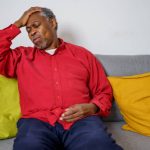I am devoted to making men of 40 years and above, live the healthy life they deserve while maintaining their sexual health. Well today, I will tell you the few practical things you must do if you are having erectile dysfunction.
Is your relationship suffering because of erection dysfunction? Worry less, because I have the practical information that would make you stand and last if you follow the instructions ideally.
Erectile Dysfunction (ED) is an often under-discussed yet increasingly common issue among men, particularly as they enter their 40s.
This condition, characterized by the difficulty to achieve or maintain an erection suitable for sexual intercourse, is not just a physical ailment; it has profound psychological and emotional repercussions as well.
See Also; Is your wife using this vagina Insertion?
Recent studies indicate that the prevalence of ED in men in their 40s is on the rise. While it was once considered a problem primarily affecting older men, ED is now understood to be more widespread among younger age groups.
This shift can be attributed to a variety of factors, including lifestyle changes, increased stress levels, and a rise in chronic health conditions like diabetes and hypertension that are closely linked to erectile dysfunction.
Attention: See the top prostate cancer signs you must ignore
The impact of ED on those experiencing it can be significant. Beyond the physical limitations, men dealing with ED often experience a range of emotional and psychological effects, including decreased self-esteem, anxiety, and even depression.
These emotional factors can further exacerbate the condition, creating a cycle that can be challenging to break.

What really is Erectile Dysfunction?
Erectile Dysfunction (ED), a condition that affects a man’s ability to achieve or maintain an erection, is a health issue that becomes increasingly prevalent with age, particularly as men reach their 40s.
Understanding ED involves recognizing both its physical and psychological aspects, as well as its potential causes and implications for overall health.
Physical and Psychological Factors
ED can result from a complex interplay of physical and psychological factors. Physically, it might be linked to the reduced blood flow, hormonal imbalances, or nerve damage.
Psychological factors, such as stress, anxiety, or depression, can also significantly contribute to ED. Understanding that ED is not purely a physical condition but often a combination of both physical and mental health issues is crucial for effective management.
Common Causes in Men in Their 40s
At this age, certain factors become more prominent in contributing to ED. These include lifestyle-related issues like obesity, smoking, excessive alcohol use, and lack of physical activity.
Chronic health conditions such as diabetes, hypertension, and heart disease also play a significant role. Additionally, the natural decrease in testosterone levels with age can contribute to erectile issues.
Impact of Age and Lifestyle
While age is a factor in the prevalence of ED, lifestyle choices significantly influence its onset and severity.
Men in their 40s often experience changes in their physical health and lifestyle that can increase the risk of ED.
Sedentary lifestyles, poor diet, and stress from personal and professional responsibilities can all contribute to the risk of developing ED.
Top Symptoms of Erectile Dysfunction
Recognizing the symptoms of ED is the first step towards addressing it. If you are having any of these, you are not alone
- Difficulty in achieving an erection
- Difficulty maintaining an erection
- Reduced sexual desire
- Combination of these
Do these if you are above 40 years and having Erectile Dysfunction
Read carefully;
- Consult a Healthcare Professional
Seeking professional medical advice is a critical step for men in their 40s experiencing symptoms of Erectile Dysfunction (ED). The importance of consulting healthcare professionals for a proper diagnosis and to explore treatment options cannot be over emphasized.
- Importance of Professional Diagnosis
Self-diagnosis and treatment of ED can be risky and ineffective. A healthcare professional can accurately diagnose the condition, identifying whether it’s caused by physical health issues, psychological factors, or a combination of both. This precise diagnosis is crucial for effective treatment.
- Discussing ED Openly
Many men find it challenging to talk about ED, but open communication with a doctor is essential. Healthcare providers are trained to handle such conversations with sensitivity and confidentiality. They can provide not only medical solutions but also guidance and support.
- Comprehensive Health Evaluation
A doctor will typically conduct a thorough physical examination and review medical history. This may include blood tests to check for underlying health issues such as diabetes, high cholesterol, or hormonal imbalances, which are often associated with ED.
- Take your Medication As Prescribed
Please carefully read this section and never take any medication without knowing the side effects, some of these medications, can cause blindness or even cardiac arrest. That’s why I would always say you know the drug you are ingesting.

For many men in their 40s experiencing erectile dysfunction (ED), medication can be a viable and effective treatment option.
Well, never take any drug without sincerely discussing it with your doctor. Concoctions like “Agbo”, and its likes would only pose more health dangers to you.
Common ED Medications:
- Phosphodiesterase Type 5 (PDE5) Inhibitors: These are the most commonly prescribed ED medications, including drugs like sildenafil (Viagra), tadalafil (Cialis), and vardenafil (Levitra). They work by increasing blood flow to the penis, thereby facilitating an erection.
- Testosterone Replacement Therapy: In cases where ED is linked to low levels of testosterone, hormone replacement therapy may be recommended. This can be administered through injections, patches, or gel.
How These Medications Work:
- PDE5 inhibitors function by relaxing the muscles in the blood vessels, allowing more blood to flow to the penis during sexual arousal. It’s important to note that these drugs do not increase sexual desire and only work in response to sexual stimulation.
- Testosterone replacement therapy addresses ED by normalizing testosterone levels, potentially improving libido and erectile function.
Potential Side Effects:
- Common side effects of PDE5 inhibitors include headaches, facial flushing, upset stomach, and nasal congestion. In rare cases, they can cause more serious side effects like vision or hearing loss.
- Testosterone therapy may lead to side effects such as acne, breast enlargement, and a potential increase in prostate health risks.
Alternatives to Medication:
- In some cases, where medication is not suitable or preferred, other treatments like vacuum erection devices, penile injections, or surgery may be options.
- Prioritizing Heart Health
Erectile Dysfunction (ED) in men in their 40s can often be a sign of underlying cardiovascular issues. Therefore, prioritizing heart health is not only crucial for overall well-being but can also be instrumental in improving or preventing ED.
- Blood Flow and Cardiovascular Health: ED often results from impaired blood flow, which is also a core issue in many heart conditions. Conditions like atherosclerosis (hardening of the arteries) can impede blood flow to various parts of the body, including the penis.
- Indicator of Heart Disease: Since the blood vessels in the penis are smaller than those in the heart, ED can sometimes manifest before other symptoms of heart diseases, such as chest pain or shortness of breath.
- Managing Stress and Mental Health
Stress and mental health issues are significant contributors to Erectile Dysfunction (ED), especially in men in their 40s.
Here, I will explore the impact of these psychological factors on ED and offers strategies for managing them effectively.

The Impact of Stress and Mental Health on ED
- Psychological Contributors: Stress, anxiety, depression, and other mental health issues can all contribute to ED. These conditions can affect libido, reduce sexual desire, and make it difficult to achieve or maintain an erection.
- The Stress-ED Cycle: Stress and ED can create a vicious cycle. The experience of ED can lead to increased stress, anxiety, and loss of confidence, which in turn can exacerbate ED.
Strategies for Managing Stress and Mental Health:
- Mindfulness and Relaxation Techniques: Practices such as meditation, deep breathing exercises, and yoga can help reduce stress and improve mental well-being.
- Regular Physical Activity: Exercise is not only good for physical health but also for mental health. It can help reduce stress, improve mood, and boost self-esteem.
- Adequate Sleep: Poor sleep can aggravate stress and anxiety. Establishing a regular sleep routine and ensuring adequate, quality sleep can have a positive effect on mental health and ED.
- Lifestyle Modifications
Adopting a healthier lifestyle can play a pivotal role in alleviating erectile dysfunction (ED) for men in their 40s.
Role of Smoking, Alcohol, and Drug Use:
- Smoking: Smoking has a detrimental effect on blood circulation and can lead to the narrowing of blood vessels, including those necessary for an erection. Quitting smoking can significantly improve ED and overall cardiovascular health.
- Alcohol: While moderate alcohol consumption might not have a significant impact, excessive drinking can lead to ED. Reducing alcohol intake can help improve erectile function.
- Drug Use: Recreational drugs are known to interfere with sexual function. Avoiding these substances is crucial for both managing ED and overall health.
- Embracing a Healthy Diet
Diet plays a crucial role in managing erectile dysfunction (ED), particularly for men in their 40s. A well-balanced, nutritious diet can not only improve overall health but also specifically aid in alleviating symptoms of ED. This section explores the dietary changes that can benefit men dealing with ED.
Foods That Improve Circulation and Overall Health:
- Heart-Healthy Foods: Since cardiovascular health is closely linked to erectile function, foods that are good for the heart can also benefit ED. This includes plenty of fruits and vegetables, whole grains, and lean proteins.
- Foods Rich in Flavonoids: Flavonoid-rich foods like berries, apples, pears, and citrus fruits can improve blood flow and decrease the risk of ED.
- Nuts and Seeds: These are high in essential fatty acids and zinc, which can boost blood flow and hormonal health.
- Regular Physical Activity
Incorporating regular physical activity is a fundamental strategy for men in their 40s dealing with erectile dysfunction (ED).
Exercise not only improves general health and well-being but also has direct benefits for managing and improving ED.
How Exercise Can Improve ED:
- Enhancing Blood Flow: Regular exercise improves cardiovascular health, which is crucial for efficient blood flow – a key factor in achieving and maintaining an erection.
- Boosting Testosterone Levels: Certain types of physical activity, especially strength training and high-intensity interval training (HIIT), can help increase testosterone levels, which play a significant role in sexual health.
- Reducing Stress: Physical activity is known to reduce stress levels, which can be beneficial since stress and anxiety are often linked to ED.
Suggested Exercises and Routines:
- Cardiovascular Exercises: Activities like brisk walking, jogging, cycling, swimming, or any aerobic exercise that increases heart rate can significantly improve heart health and blood flow.
- Strength Training: Muscle-building exercises, done at least two days a week, can enhance testosterone levels and overall fitness.
- Flexibility and Balance Exercises: Practices like yoga or Pilates not only improve flexibility and balance but also help in reducing stress and anxiety.
Setting Realistic Goals:
- Start Slow: For those who are new to exercise, it’s important to start slowly and gradually increase intensity and duration.
- Consistency: Regularity is key. Aim for at least 150 minutes of moderate-intensity or 75 minutes of high-intensity aerobic activity per week, plus strength training.
- Variety: Mixing different types of workouts can keep the exercise routine engaging and cover all aspects of fitness.
- Prioritizing Sleep and Rest
Sleep and rest play a crucial role in overall health and particularly in managing erectile dysfunction (ED) for men in their 40s.
Adequate sleep is essential for hormonal balance, stress reduction, and general well-being, all of which are important factors in addressing ED. This section outlines the importance of quality sleep and offers tips for improving sleep patterns.
The Importance of Quality Sleep for Sexual Health:
- Hormonal Regulation: Sleep is critical for the regulation of testosterone, the hormone that plays a key role in sexual drive and erectile function. Poor sleep can lead to lower testosterone levels.
- Stress Reduction: Adequate rest helps in managing stress and anxiety, which are often linked to ED.
- Overall Health: Good sleep is essential for overall health, including cardiovascular health, which is directly related to erectile function.
Tips for Improving Sleep Patterns:
- Establish a Regular Sleep Schedule: Going to bed and waking up at the same time every day helps regulate the body’s internal clock and can improve sleep quality.
- Create a Restful Environment: Ensure the bedroom is dark, quiet, and cool. Investing in a comfortable mattress and pillows can also make a significant difference.
- Limit Screen Time Before Bed: Exposure to the blue light from screens can interfere with the body’s ability to produce melatonin, the hormone that controls sleep-wake cycles.
- Avoid Stimulants: Reducing the intake of caffeine and avoiding it in the afternoon and evening can help improve sleep quality. Similarly, avoiding nicotine and alcohol, which can disrupt sleep, is advisable.
- Building a Supportive Relationship
For men in their 40s experiencing erectile dysfunction (ED), the role of a supportive relationship cannot be overstated.
ED can impact not only the individual but also their partner, affecting emotional intimacy and overall relationship dynamics.
The Role of Communication and Intimacy:
- Open Dialogue: Open and honest communication with a partner about ED is crucial. It helps in building understanding and empathy, reducing feelings of isolation or guilt that the affected individual may experience.
- Addressing Emotional Impact: ED can be challenging for both partners. Discussing feelings and concerns can help in navigating the emotional complexities and maintaining a strong, supportive bond.
Kindly note that the combination of these 9 actions or any of these would be a perfect fit for you. I want you to take a professional approach in the fight against erectile dysfunction.
I want to see you stand fit and strong.
Recommendations
Most common psychiatric drugs in the world
Viagra: Uses, Dosage, Side Effects and Composition

3 comments